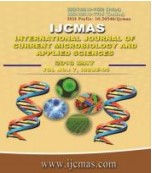


 National Academy of Agricultural Sciences (NAAS)
National Academy of Agricultural Sciences (NAAS)

|
PRINT ISSN : 2319-7692
Online ISSN : 2319-7706 Issues : 12 per year Publisher : Excellent Publishers Email : editorijcmas@gmail.com / submit@ijcmas.com Editor-in-chief: Dr.M.Prakash Index Copernicus ICV 2018: 95.39 NAAS RATING 2020: 5.38 |
Zinc deficiency not only affects crop yields, but also nutritional quality and human health. Microbial transformation of unavailable forms of soil zinc to plant available zinc is an important approach contributing to plant zinc nutrition. Therefore, Nutrient uptake and biological activity in Tomato crop by zinc solubilizing bacterial isolates was tested under glass house condition. The study consisted of six treatments, each with five replications, including five different zinc solubilizing bacteria and uninoculated control, out of five bacteria B. aryabhattai was used as reference strain. The results revealed that tomato seedlings treated with B. aryabhattai and Bacillus sp. (PAN-TM1) substantially decreased rhizosphere pH and increased the macro and micro nutrient concentration in rhizosphere, plant and tomato fruit especially zinc concentration in the fruit (31.1 and 29.3 ppm respectively). Further biological activity viz., dehydrogenase, urease, acid and alkaline phosphatase, soil respiration and soil microbial biomass carbon was also found to be increased significantly with the B. aryabhattai and Bacillus sp.(PAN-TM1) treated seedlings as compared to uninoculated treatment. This assumes significance as the increased zinc concentration found in this study has large implications in terms of overcoming zinc malnutrition. ZSB isolates i.e. B. aryabhattai and Bacillus sp. (PAN-TM1) substantially influenced mobilization of zinc and its concentration in edible portion, which can be utilized as bio-inoculants for biofertilization and biofortification in the sustainable crop production practices.
 |
 |
 |
 |
 |